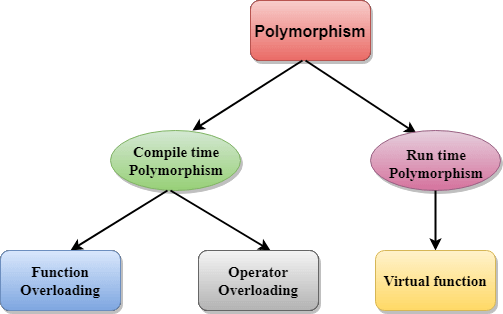C++ Polymorphism
The term "Polymorphism" is the combination of "poly" + "morphs" which means many forms. It is a greek word. In object-oriented programming, we use 3 main concepts: inheritance, encapsulation, and polymorphism.
Real Life Example Of Polymorphism
Let's consider a real-life example of polymorphism. A lady behaves like a teacher in a classroom, mother or daughter in a home and customer in a market. Here, a single person is behaving differently according to the situations.
There are two types of polymorphism in C++:

- Compile time polymorphism: The overloaded functions are invoked by matching the type and number of arguments. This information is available at the compile time and, therefore, compiler selects the appropriate function at the compile time. It is achieved by function overloading and operator overloading which is also known as static binding or early binding. Now, let's consider the case where function name and prototype is same.
In the above case, the prototype of display() function is the same in both the base and derived class. Therefore, the static binding cannot be applied. It would be great if the appropriate function is selected at the run time. This is known as run time polymorphism.
- Run time polymorphism: Run time polymorphism is achieved when the object's method is invoked at the run time instead of compile time. It is achieved by method overriding which is also known as dynamic binding or late binding.
Differences b/w compile time and run time polymorphism.
| Compile time polymorphism | Run time polymorphism |
|---|---|
| The function to be invoked is known at the compile time. | The function to be invoked is known at the run time. |
| It is also known as overloading, early binding and static binding. | It is also known as overriding, Dynamic binding and late binding. |
| Overloading is a compile time polymorphism where more than one method is having the same name but with the different number of parameters or the type of the parameters. | Overriding is a run time polymorphism where more than one method is having the same name, number of parameters and the type of the parameters. |
| It is achieved by function overloading and operator overloading. | It is achieved by virtual functions and pointers. |
| It provides fast execution as it is known at the compile time. | It provides slow execution as it is known at the run time. |
| It is less flexible as mainly all the things execute at the compile time. | It is more flexible as all the things execute at the run time. |
C++ Runtime Polymorphism Example
Let's see a simple example of run time polymorphism in C++.
// an example without the virtual keyword.
Output:
Eating bread...
C++ Run time Polymorphism Example: By using two derived class
Let's see another example of run time polymorphism in C++ where we are having two derived classes.
// an example with virtual keyword.
Output:
drawing...
drawing rectangle...
drawing circle...
Runtime Polymorphism with Data Members
Runtime Polymorphism can be achieved by data members in C++. Let's see an example where we are accessing the field by reference variable which refers to the instance of derived class.
Output:
Black
Comments
Post a Comment